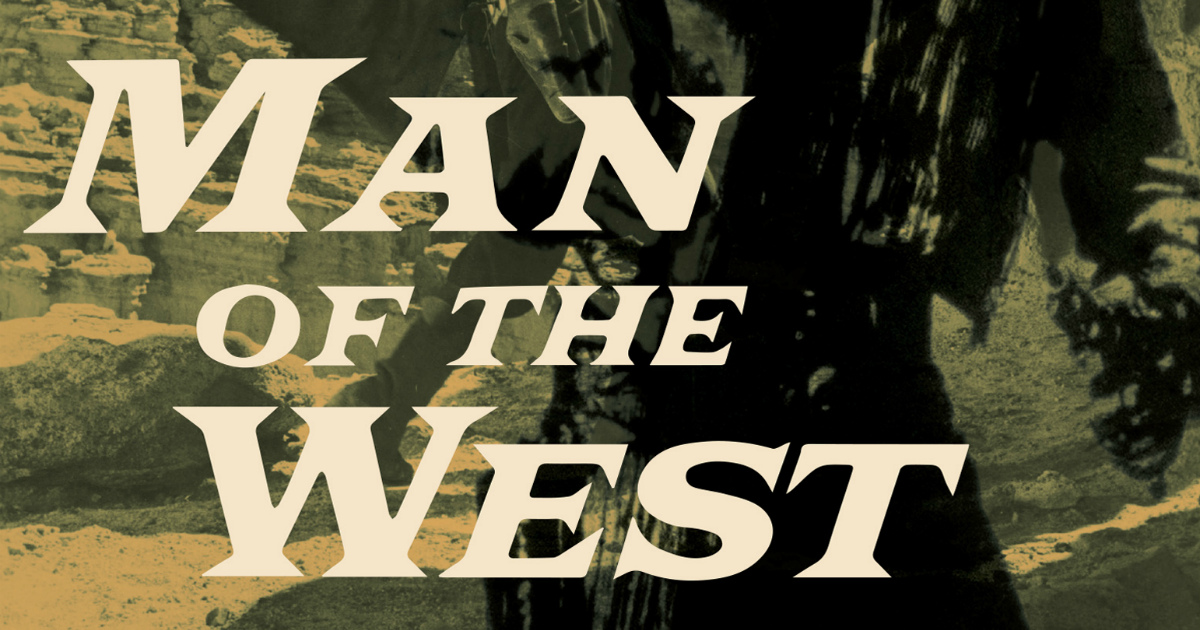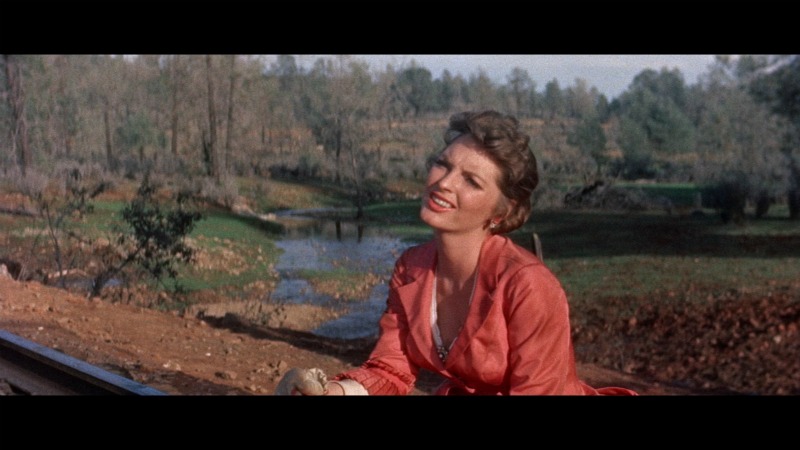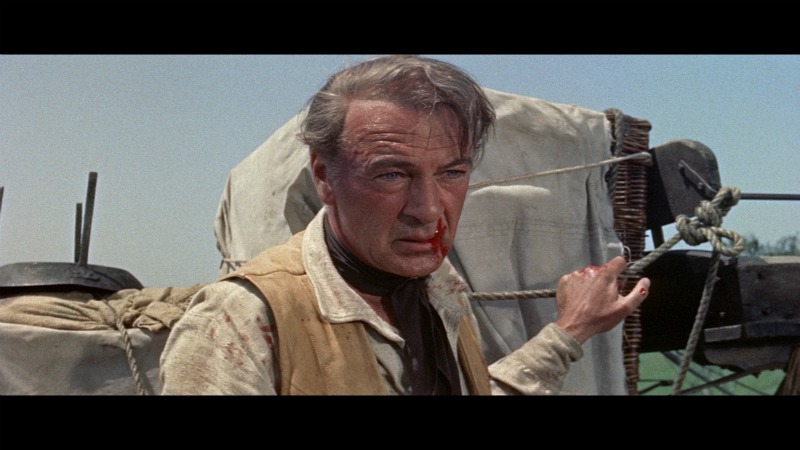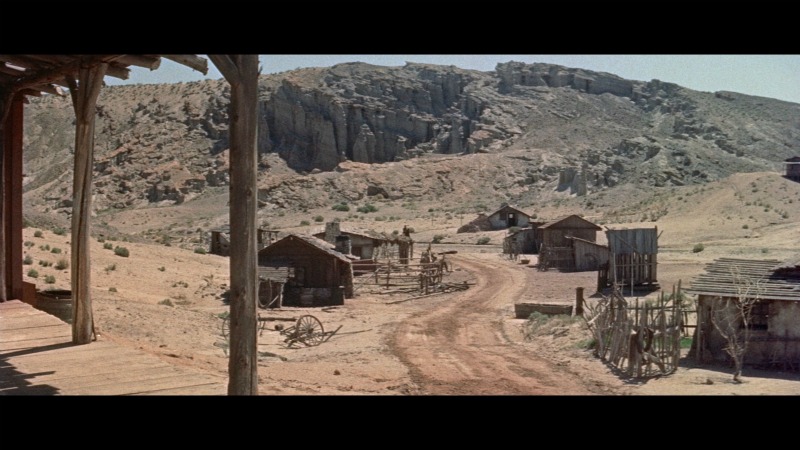
Unlike his hard-edged, often abrasive films noir and war, Anthony Mann’s Man of the West is built on an illusion. As is noted in Glenn Kenny and Farran Nehme’s excellent commentary track (which accompanies this release), Man of the West introduces a vision of the American frontier that is colorful, lively, and friendly – people may have their ulterior motives, but they speak plainly and cheerfully – only to thoroughly gut that fantasy, dragging us deeper into the depths than most westerns of its era attempted. The result is one of the most frightening, tortuous westerns of the classical era.
Gary Cooper plays the titular man, Link Jones, on a train to Fort Worth to hire a schoolteacher for the small, God-fearing town of Good Hope, in which he resides. Like many Cooper characters from the later part of his career, he’s not much for talking, but carries himself as an upstanding, reliable man. Little mystery why con man Sam Beasley (Arthur O’Connell) spots him for a mark, instantly trying to sell him on saloon singer Billie Ellis’ (Julie London) qualities for the open position (and the substantial cash advance that comes with it). Before long, however, the train is robbed, Link’s bag of money stolen, and he, Sam, and Billie stranded on the side of the track – no town for a hundred miles, no train for another week.
Luckily, Link knows of a small house nearby.
Unluckily, Link doesn’t know who’s in it.

What lies on the other side of that door is not as explicitly shocking as that to which an audience in the age of Hostel (to really date myself with a ten-year-old reference) might respond, but it is nonetheless a grotesque invasion. And, sure, Mann was working within the Production Code, which demanded a certain sort of decency that filmmakers of his ilk tended to pervert. And, sure, you could say that Mann was talented enough that he doesn’t need explicit material to get his point across. But all that’s a little reductive. Mann simply shows an invasive, sexually violent act for what it is – horrible, and the sort of thing no person should ever be put through. And he frames it in such a way that suggests that either he or the audience might get a little turned on by it, too. Rather than detract from his integrity, though, he adds to it, making himself, and us, complicit in its execution, and the ideology that allows such things to happen. To simply acknowledge the presence of evil as an outside force is an amateur move; recognizing the evil within oneself proves far more enlightening.
That sentiment is embedded more thoroughly in Link himself, revealed to be a former bandit, a member of the very gang that takes he, Sam, and Billie prisoner. He is the Man of the West, a natural outgrowth of a time and place in which the law had very little ability to govern, and criminals could run free for their entire lives. He embodies the bandit’s strength, his cunning, but also his cowardice and incompetence. When Link does stand up for himself or his fellow prisoners, it’s not the typical Cooper “strong, silent type” coming to life. It’s a man who has to constantly make the decision to do what’s right, and who will sometimes fall short of doing so. The dream of “the West” has been so romanticized in American culture, that to see Cooper embody it here is systematically challenging. Does that title apply to him for his criminal past, or his virtuous present? Does it encompass both? Or is it predicated upon the fact of his personal reinvention, the redemption that took place years before?

Masters of Cinema brings all the splendor and degradation of the West to (Region B locked) Blu-ray in a very good 1080p presentation. Outdoor color is the real highlight, with the costumes’ pastel beauty and the desert landscapes really popping in a natural way. The picture is sharp, has very good grain integrity, and excellent depth. Damage pops up frequently, but not distractingly – one or two small white marks enter the image every few seconds, for only a single frame apiece, getting a little busier around where the reel changes would be. Night scenes suffer a bit more, losing detail in the darker areas of the frame, and colors looking slightly more crushed. As most of the film takes place outdoors, in daytime, this is not a major issue, but it is there. On the whole, it’s a very pleasing presentation.
Two supplements accompany the film on the disc – the aforementioned commentary track with Kenny and Nehme, and a short video piece with Douglas Pye. Kenny and Nehme are working film critics, and Pye is a scholar, so both take a more analytical approach, while peppering in history of the production and its players. They complement one another nicely, Pye’s being the slightly more formal presentation, with Kenny and Nehme more keen to kick back and casually discuss the film.

The booklet is a real treat, giving us a 1959 review by Jean-Luc Godard (which Kenny also cites in the commentary) from Cahiers du cinema and a 1998 CineAction article by Robin Wood. They are presented in that order, which is key, not just chronologically, but more pertinently because Godard has a tendency to write in bold proclamations, with a bit of material evidence, while Wood looks to unpack the evidence in hopes we’ll reach the same conclusion he has. I admire both approaches, and greatly relished these essays.
For those looking to dive into what makes Anthony Mann one of cinema’s great artists, you could hardly do better than this package, which is almost pure (and excellently-observed) critical investigation. As that is what I prize most in home video releases, I am a big fan of Masters of Cinema’s new release, and recommend it heartily.


